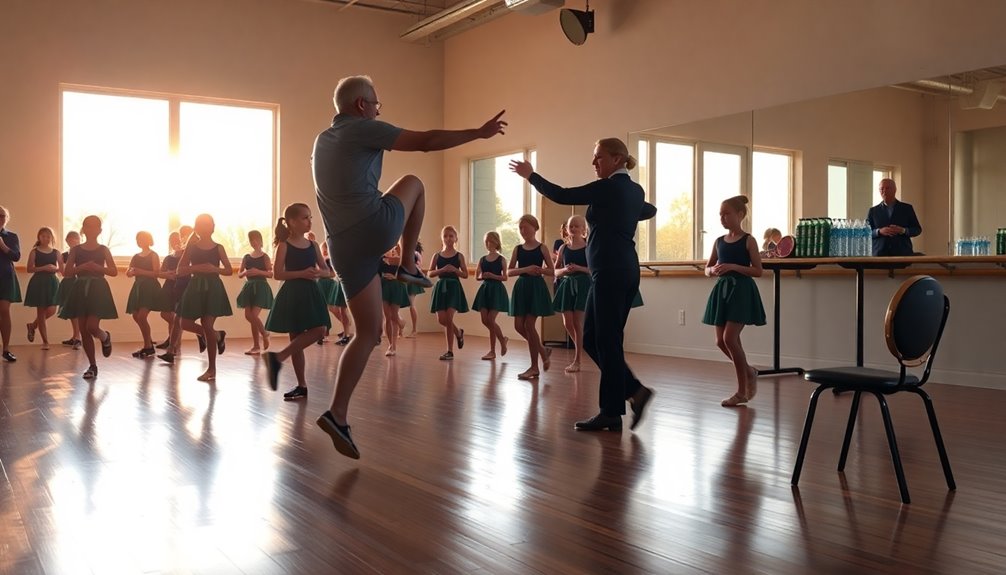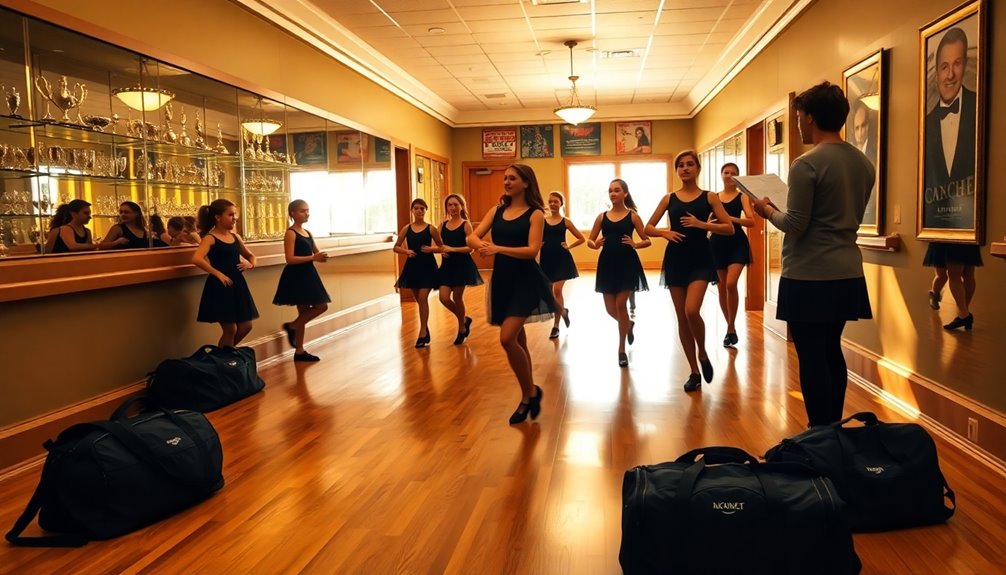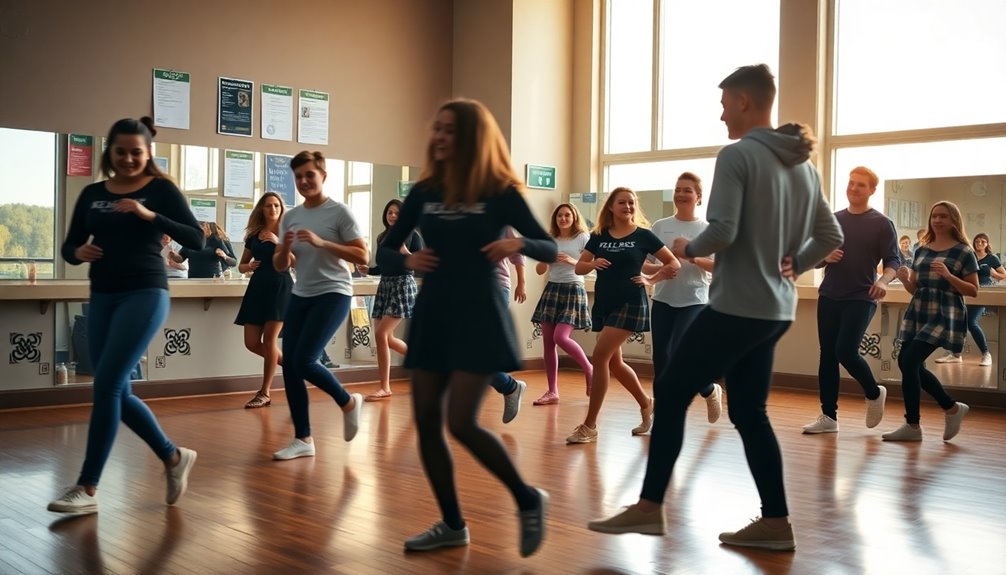
You can find Irish dance classes at community centers, performing-arts schools, cultural and heritage organizations, university clubs, and private studios, plus short-term festival workshops and programs tied to touring companies. Classes range from casual, social sessions to rigorous technique training and performance-focused rehearsals, with options for all ages and levels. Look for local listings or organization websites to compare schedules and styles — keep going and you’ll discover specifics on where and how to join.
Community Centers With Irish Dance Programs
If you’re looking for accessible, affordable Irish dance classes, community centers are a great place to start; they often partner with local instructors to offer beginner through advanced sessions, drop-in workshops, and cultural events that let you try dance without a big commitment. You’ll find classes that fit your schedule and budget, giving you freedom to explore at your own pace. Community engagement is central: potlucks, open houses, and neighborhood performances connect you with others who share a love of movement. Expect practical instruction focused on technique and joy, plus chances for cultural enrichment through music, storytelling, and history. These programs let you build skill, confidence, and a local network without feeling locked into rigid schedules.
Performing Arts Schools Teaching Irish Stepdance
Community centers are a friendly, low-pressure way to try Irish dance, but if you want structured training, performance opportunities, or a curriculum that ties technique to stagecraft, performing arts schools are where you’ll find that focus. You’ll get disciplined classes that still let you express yourself, with rehearsal schedules, choreography labs, and chances to appear in showcases or enter Irish dance competitions. Teachers link steps to presence so you can own the stage and travel to Irish dance festivals with confidence. Below is a quick comparison to help you choose.
| Program Type | Typical Offerings |
|---|---|
| Technique Classes | Footwork, posture, timing |
| Stagecraft Labs | Choreography, acting, projection |
| Performance Teams | Shows, competitions |
| Festival Prep | Costumes, adjudicator feedback |
Cultural and Heritage Organizations Offering Classes
When you’re interested in the roots of Irish dance as much as the steps, cultural and heritage organizations are ideal places to learn—they pair instruction with storytelling, music history, and traditions so you understand why moves matter. You’ll find settings that value cultural exchange and heritage preservation, where classes encourage exploration, context, and personal expression. These groups often welcome all levels and let you connect with community archives, musicians, and elders who share songs and lore.
- Local cultural centers offering workshops that combine history and technique.
- Heritage societies hosting seasonal classes tied to festivals and rituals.
- Museums coordinating movement sessions with exhibits on Irish life.
- Community clubs promoting cultural exchange through shared performances and informal sessions.
Schools Linked to Irish Dance Touring Companies

If you’re interested in performance-level training, look for schools affiliated with Irish dance touring companies. These programs often combine rigorous technique classes with stagecraft and touring experience. You’ll get opportunities to prepare for auditions and public performances under company guidance.
Touring Company Affiliations
Although many Irish dance schools focus mainly on local classes and competitions, some maintain formal links with touring companies that offer performance opportunities and advanced training; these affiliations can give you a clear pathway from classroom steps to professional stage work, while raising a school’s profile and access to guest choreographers. You’ll find schools that use touring-company ties to broaden your horizons, letting you study choreography techniques learned on tour, attend masterclasses, and test skills beyond dance competitions. These partnerships respect your desire for freedom, offering flexible involvement—audition, short-term projects, or full-season commitments. Benefits often include:
- Access to touring choreographers for workshops.
- Priority audition notices and casting calls.
- Mentorship from company dancers.
- Performance networking and resume building.
Performance Training Schools
Because these schools are directly linked to touring companies, you’ll get training that’s explicitly geared toward stage work—think extended choreography, stamina-building rehearsals, and production-level discipline—rather than just competition technique. You’ll learn performance techniques that help you own a stage, project emotion, and move as part of a larger ensemble without losing your personal flair. Classes focus on choreography development for full-length shows, shifts, and theatrical timing, so you can adapt quickly on tour. Instructors expect professionalism and flexibility, but they’ll also encourage creative input, letting you shape solos or group moments. If you crave freedom to grow beyond medals, these schools give you the tools to perform confidently, sustain long runs, and collaborate in real-world touring environments.
University and College Irish Dance Clubs and Courses

On campus you’ll often find Irish dance clubs that welcome all skill levels and stage performances for university events. Some schools also offer credit-bearing dance courses that teach technique, history, and choreography as part of the curriculum. Many programs partner with local community ensembles so you can train with professionals and perform off-campus.
Campus Irish Dance Clubs
When you join a campus Irish dance club, you’ll find a mix of beginners, experienced dancers, and fans who just love the music and community, with many clubs offering weekly classes, socials, and performances that fit student schedules. You’ll plug into campus culture that’s open and flexible, where practice spaces, casual drop‑ins, and themed nights make it easy to explore Irish dance without rigid commitment. Clubs often collaborate with other groups for festivals or gigs, and you can shape your involvement to suit free, busy student life.
- Weekly technique classes for all levels.
- Socials and céilí nights to relax and connect.
- Performance opportunities on and off campus.
- Peer-led workshops and choreography sessions.
Credit-Bearing Dance Courses
Campus clubs are a great way to try Irish dance casually, but if you want formal instruction and academic credit, many universities and colleges also offer credit-bearing dance courses focused on Irish step and social dance. You can enroll when course availability aligns with your schedule and pick classes that fit your pace and goals. Check syllabi for credit requirements, grading, and prerequisites so you know what’s expected before you commit. These courses often balance technique, history, and performance, giving you structured practice without locking you into an overly rigid path. If you value autonomy, look for electives or modular programs that let you steer your learning—some campuses let you combine studio hours with research or choreography projects.
Community-Affiliated Ensembles
If you want a balance between casual practice and structured support, university-affiliated Irish dance ensembles and clubs offer that middle ground: they combine student leadership, faculty oversight, and community ties to give dancers performance opportunities, regular rehearsals, and access to campus resources. You’ll find flexible commitment levels, chances to lead choreography, and connections with local teachers. These groups often perform at community events and enter local competitions, but you won’t be locked into a rigid schedule — pick the role and intensity that fits your freedom. Expect workshops, social nights, and shared travel to feiseanna. Consider joining if you want teamwork without sacrificing autonomy.
- Regular rehearsals with voluntary leadership roles
- Performance slots at community events
- Prep for local competitions
- Workshops and social gatherings
Private Studios Specializing in Traditional Irish Dance
Although private studios vary in size and style, they usually focus on authentic footwork, musicality, and choreography rooted in traditional Irish steps. You’ll find instructors teaching traditional techniques and diverse choreography styles so you can move freely, refine timing, and express yourself within a classic framework. Lessons often balance strict technique with creative freedom, letting you choose performance goals or casual enjoyment. Class sizes, costume guidance, and exam preparation vary, but studios aim to empower your personal journey. Below is a simple snapshot to help you compare options.
| Feature | Typical Offerings |
|---|---|
| Class focus | Traditional techniques, musicality |
| Size | Small groups to private lessons |
| Goals | Exams, performance, personal growth |
| Atmosphere | Disciplined yet freeing |
Festival and Workshop Hosts Providing Short-Term Classes
When you attend a festival or weekend workshop, you’ll get concentrated, hands-on Irish dance instruction from guest teachers and champion performers who bring fresh techniques and high-energy routines; these short-term formats are ideal for trying new styles, sharpening specific skills, or preparing for a performance without a long-term commitment. You can immerse yourself, explore steps you’ve been curious about, and leave refreshed. Festival workshops and dance festivals offer varied levels, pop-up sessions, and social dancing, so you pick your pace and focus. You’ll meet mentors and peers who encourage creative expression and autonomy in your movement.
Concentrated, hands-on weekend workshops offering fresh techniques, performance prep, and social dancing to spark creative expression.
- Intensive technique clinics for quick gains
- Style labs to experiment freely
- Performance rehearsals for stage confidence
- Social sessions to connect and improvise
Some Questions Answered
Do Irish Dance Classes Require Prior Dance Experience?
No, you don’t need prior experience; Irish dance welcomes all levels. Classes cover various dance styles, are beginner friendly, and let you explore rhythm and footwork freely while choosing your own pace and creative expression.
What Is the Typical Cost per Class or Session?
You’ll typically pay $10–$25 per class or $40–$100 session fees, with variations by studio, instructor expertise, and location; class pricing can feel like investing in wings, freeing you to leap and soar.
Are There Age Limits for Beginners?
Yes — you’re free to start at many ages; age flexibility means most schools welcome beginners from kids to adults, and beginner benefits include fitness, community, and skill growth, so you’ll find a class that fits you.
Do Classes Prepare Students for Competitions?
Yes — classes do prepare you for competitions, ironically turning casual steps into polished routines; they’ll build competition readiness and performance skills while still letting you choose your commitment level, so you stay free to dance your own way.
Are Online or Virtual Irish Dance Classes Available?
Yes — you can take virtual Irish dance classes; virtual platforms offer flexible class formats like live group sessions, private lessons, and recorded tutorials so you can learn and practice on your own schedule, wherever freedom leads you.
